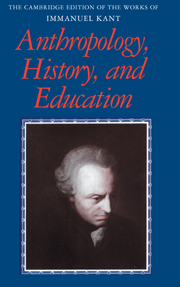Book contents
- Frontmatter
- Contents
- General editors' preface
- Preface
- General introduction
- 1 Observations on the feeling of the beautiful and sublime (1764)
- 2 Essay on the maladies of the head (1764)
- 3 Review of Moscati's work Of the corporeal essential differences between the structure of animals and humans (1771)
- 4 Of the different races of human beings (1775)
- 5 Essays regarding the Philanthropinum (1776/1777)
- 6 A note to physicians (1782)
- 7 Idea for a universal history with a cosmopolitan aim (1784)
- 8 Review of J. G. Herder's Ideas for the philosophy of the history of humanity. Parts 1 and 2 (1785)
- 9 Determination of the concept of a human race (1785)
- 10 Conjectural beginning of human history (1786)
- 11 Some remarks on Ludwig Heinrich Jakob's Examination of Mendelssohn's Morning hours (1786)
- 12 On the philosophers' medicine of the body (1786)
- 13 On the use of teleological principles in philosophy (1788)
- 14 From Soemmerring's On the organ of the soul (1796)
- 15 Anthropology from a pragmatic point of view (1798)
- 16 Postscript to Christian Gottlieb Mielcke's Lithuanian–German and German–Lithuanian dictionary (1800)
- 17 Lectures on pedagogy (1803)
- Editorial notes
- Glossary
- Bibliography
- Index
3 - Review of Moscati's work Of the corporeal essential differences between the structure of animals and humans (1771)
Published online by Cambridge University Press: 05 May 2013
- Frontmatter
- Contents
- General editors' preface
- Preface
- General introduction
- 1 Observations on the feeling of the beautiful and sublime (1764)
- 2 Essay on the maladies of the head (1764)
- 3 Review of Moscati's work Of the corporeal essential differences between the structure of animals and humans (1771)
- 4 Of the different races of human beings (1775)
- 5 Essays regarding the Philanthropinum (1776/1777)
- 6 A note to physicians (1782)
- 7 Idea for a universal history with a cosmopolitan aim (1784)
- 8 Review of J. G. Herder's Ideas for the philosophy of the history of humanity. Parts 1 and 2 (1785)
- 9 Determination of the concept of a human race (1785)
- 10 Conjectural beginning of human history (1786)
- 11 Some remarks on Ludwig Heinrich Jakob's Examination of Mendelssohn's Morning hours (1786)
- 12 On the philosophers' medicine of the body (1786)
- 13 On the use of teleological principles in philosophy (1788)
- 14 From Soemmerring's On the organ of the soul (1796)
- 15 Anthropology from a pragmatic point of view (1798)
- 16 Postscript to Christian Gottlieb Mielcke's Lithuanian–German and German–Lithuanian dictionary (1800)
- 17 Lectures on pedagogy (1803)
- Editorial notes
- Glossary
- Bibliography
- Index
Summary
EDITOR'S INTRODUCTION
The Königsbergische Gelehrte und Politische Zeitungen (Königsberg Learned and Political Newspaper) of 23 August 1771 (issue No. 67, pp. 265f.) contained an anonymous review of the German translation of a booklet by the Italian physician and anatomist, Pietro Moscati (1739–1824), professor of anatomy at the University of Pavia, entitled Von dem körperlichen wesentlichen Unterschiede zwischen der Struktur der Thiere und Menschen. Eine akademische Rede, gehalten auf dem anatomischen Theater zu Pavia (Of the Corporeal Essential Differences Between the Structure of Animals and Humans. An Academic Oration Held in the Anatomical Theater of Pavia). The Italian original had appeared in 1770 in Milan under the title Delle corporee differenze essenziali che passano fra la struttura de' bruti e la umana. A second edition, containing an appendix in which Moscati replied to his critics, came out in Brescia in 1771. The German translation was by Johann Beckmann (1738–1811), professor of philosophy and later of economics at the University of Göttingen.
Kant's authorship the review of Moscati's work has been established circumstantially. The review states Moscati's main thesis that the erect position in the human being is artificial and unnatural and enumerates the evidence cited by Moscati for his thesis. In concluding, the reviewer distinguishes between the animal nature of the human being, which is geared toward self-preservation and the preservation of the species and includes the four-legged position, and the rational nature of the human being, which is geared toward society and elicits the two-legged position.
- Type
- Chapter
- Information
- Anthropology, History, and Education , pp. 78 - 81Publisher: Cambridge University PressPrint publication year: 2007
- 1
- Cited by



